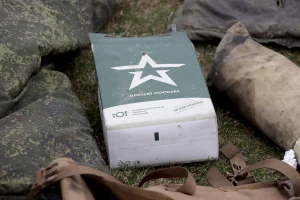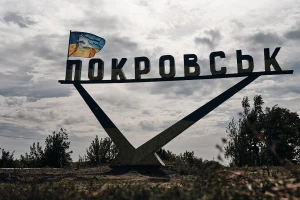
US alters plans for Ukraine amid dwindling hopes for Russia talks. Column by Vitaly Portnikov
Putin does not need dialogue with Americans, as it is not in alignment with his ambitious plans
The Washington Post insists that the U.S. is preparing a new strategy to assist Ukraine in countering Russian aggression, aiming for Ukraine to maintain control over all territories currently under the legitimate Ukrainian government. The focus is on strengthening the Armed Forces of Ukraine (ZSU) and rebuilding the Ukrainian economy, devastated by Russian invasion.
The Washington Post argues that such a plan reflects a sharp shift in approaches compared to the past year when the U.S. and other Western countries hoped that the weapons provided to the Armed Forces of Ukraine would help expand territories under the control of the legitimate Ukrainian government. The expectation was that this would strengthen Kyiv's position during potential negotiations with Russia.
Now, it seems that the West has realized that liberating territories will be a challenging task for ZSU. By the way, if the focus then was on liberating territories, it would have been worth considering air superiority, not just the equipment the Ukrainian military received in 2023.
"It has also become evident that the negotiation process with Russia is a highly abstract matter. Neither the Russian president nor his closest representatives, and importantly, the majority of Russian society, do not seem inclined to end the war with Ukraine. Instead, they believe that the war should persist until the ultimate so-called victory of Russia, meaning the incorporation of Ukrainian territories into the Russian state."
And it is precisely the realization of such intentions that the new American strategy seeks to impede. This refers to efforts aimed at making the Russian president at least realize that his plans for annexing the Ukrainian state to Russia and destroying Ukrainian statehood as such are unlikely to materialize. Putin will have to come to terms with the fact of the existence of an independent Ukrainian state and nation, even if it completely contradicts his ambitious chauvinistic and imperialistic plans for the future years.
The planning by the United States, as emphasized by The Washington Post, is part of the efforts of nearly three dozen countries supporting Ukraine to ensure long-term security and economic support. Importantly, this support is now becoming more institutionalized, as evident from the recent security agreement between Ukraine and the United Kingdom, signed by the Prime Minister of the UK, Rishi Sunak, and President Volodymyr Zelenskyy in the Ukrainian capital.
As is known, a visit of the President of the French Republic Emmanuel Macron to Kyiv is currently being prepared. He is also expected to sign a corresponding agreement with President Volodymyr Zelenskyy. This agreement is believed to be a crucial part of Ukraine's survival in the coming difficult years of confrontation and struggle with an aggressive Russia.
"However, both American journalists and we understand that the success of this strategy will primarily depend on the United States, being the largest donor to Ukraine. This is true concerning financial and military support, as well as the coordination of multilateral efforts aimed at sustaining and supporting Ukraine in its protracted future war with Russia."
Of course, much will also depend on how events unfold in the U.S. Congress. It has become evident that the Speaker of the House, Mike Johnson, is not willing to compromise with the Democratic administration and Democratic congressmen. This reluctance has hindered the release of $61 billion in funding for Ukraine in exchange for concessions in improving U.S. immigration legislation.
Regardless, the American strategy must materialize amidst the ongoing electoral contest in the United States. Former U.S. President Donald Trump, who is very close to securing the nomination as a presidential candidate, hopes to find an alternative way to address the situation arising from Russia's aggressive attack on Ukraine on February 24, 2022. Specifically, he emphasizes dialogue with the President of Russia.
As I mentioned earlier, Putin has no interest in any dialogue with Americans because the restoration of the Russian Empire within the borders of the 1991 USSR remains both a strategic goal of the chauvinistically inclined Russian president and a demand of the entire society infected with chauvinistic tendencies in Russia. It is prepared to pay any price to ensure that the Russian Federation continues to expand not only within the former boundaries of the Soviet Union but also within the territories of the former Soviet republics that declared their independence and sovereignty in 1991.
To understand this, one simply needs to listen to the statements made by Russian leaders over the past 30 years during the existence of Russia and other former Soviet republics as independent states. However, it is evident that if Ukraine demonstrates resilience and the ability to resist Russian intentions, it will force Putin to, if not abandon his ambitious plans, at least freeze them for the future. He may wait for a weakening of the Western world and the Ukrainian state before delivering a decisive blow right to the heart.
It is crucial for this heart, targeted by the Russian aggressor, to be securely defended. This is the purpose for which the new American strategy to aid Ukraine must work. By and large, this strategy should already be implemented before the November presidential elections in the United States.
"Regardless of the outcome of these elections, whatever the position of the future President of the United States, whoever is elected, Russia should have no doubts that it will not succeed in subduing Ukrainian statehood as a whole."
The fragments of Ukrainian territory currently occupied by Russia are clearly not what Putin desires. He has primarily transformed these Ukrainian regions into a bridgehead for attacking Ukraine.
If this bridgehead proves ineffective, there may be future opportunities for the return of the occupied Ukrainian territories to our state, not only through military means but also through political avenues. However, we must remember that this involves a multi-year process of restoring international law and reducing the capabilities of authoritarian regimes globally. In this process, we will have to navigate not only the coming years but also the challenging decades of the tumultuous 21st century – a century marked by wars, conflicts, crises, and pandemics. Perhaps the most intriguing and complex century in the history of humanity.
About the author. Vitaly Portnikov, journalist, laureate of the National Shevchenko Prize of Ukraine.
The editors do not always endorse the opinions expressed by blog authors.
- News













































